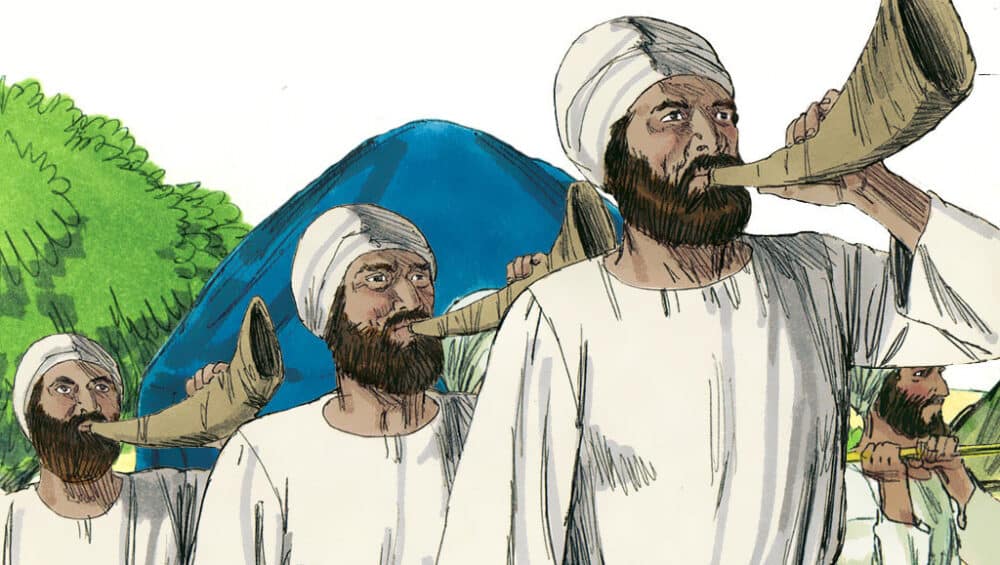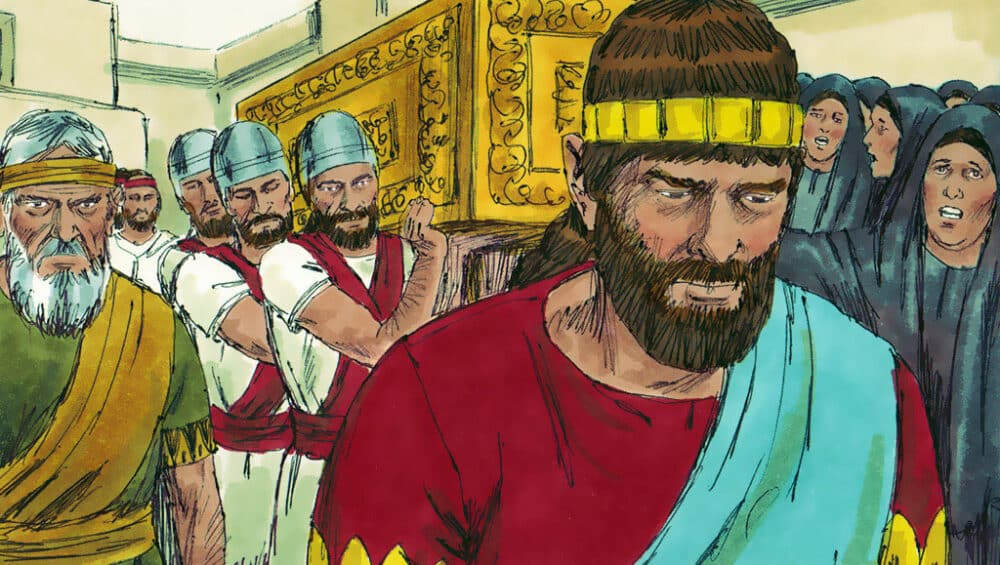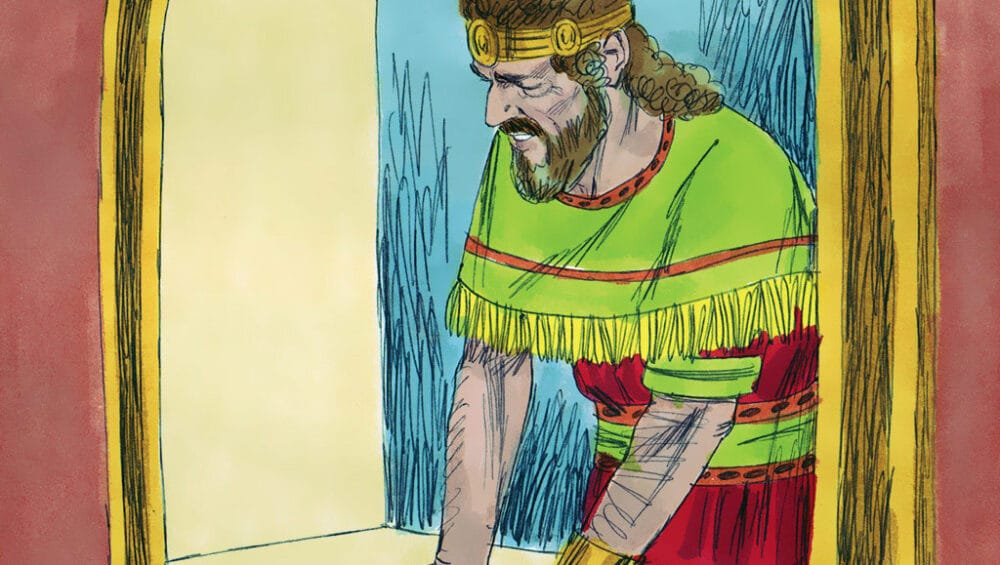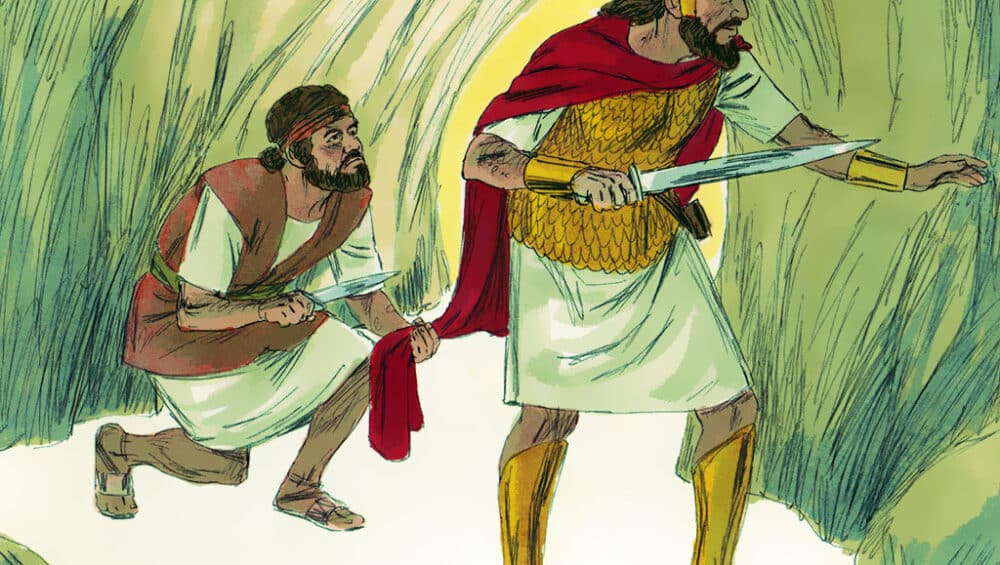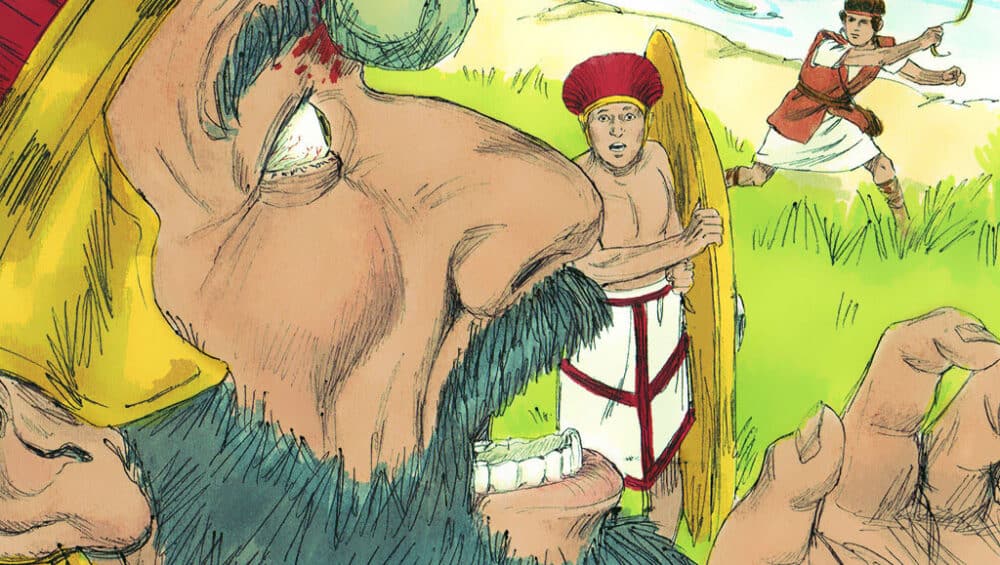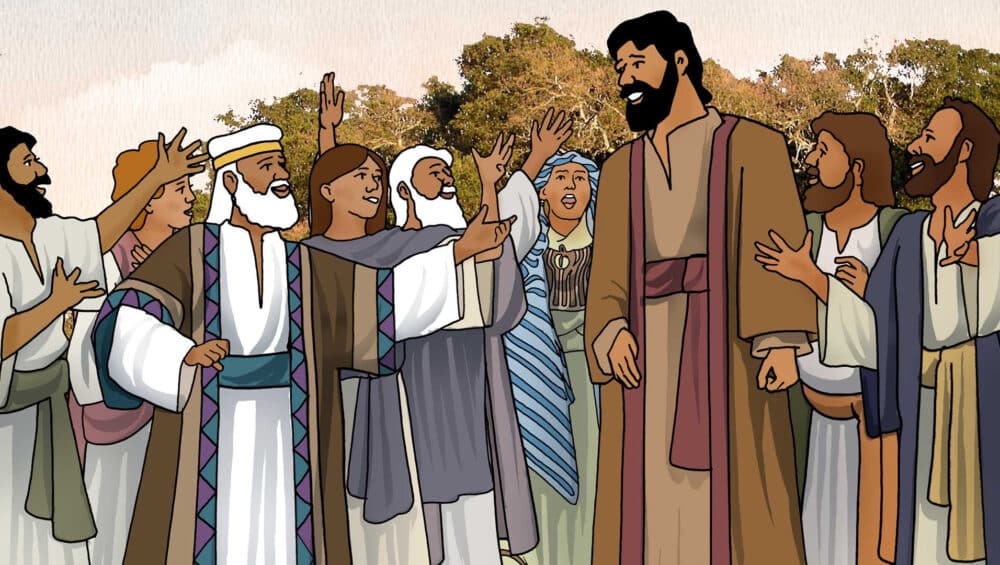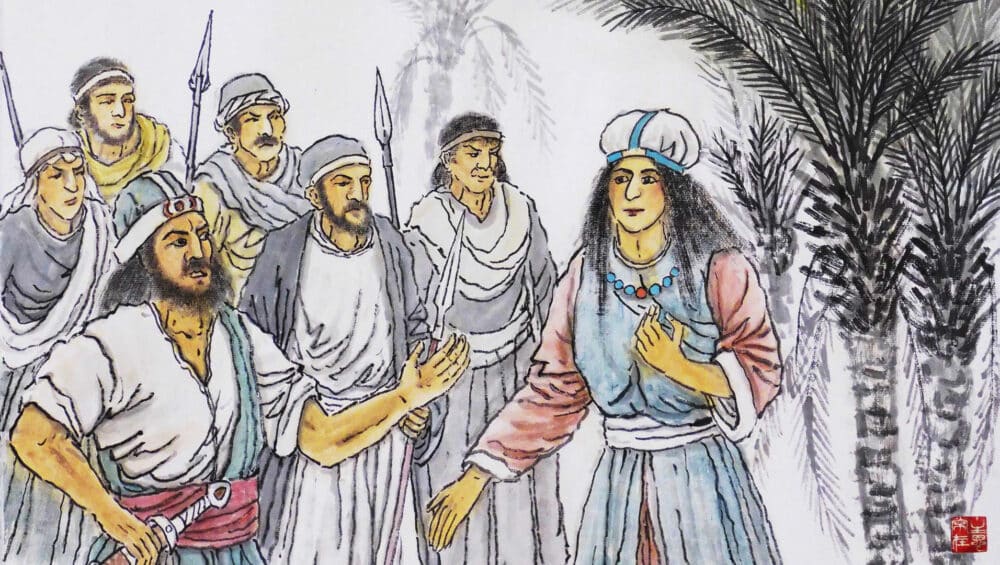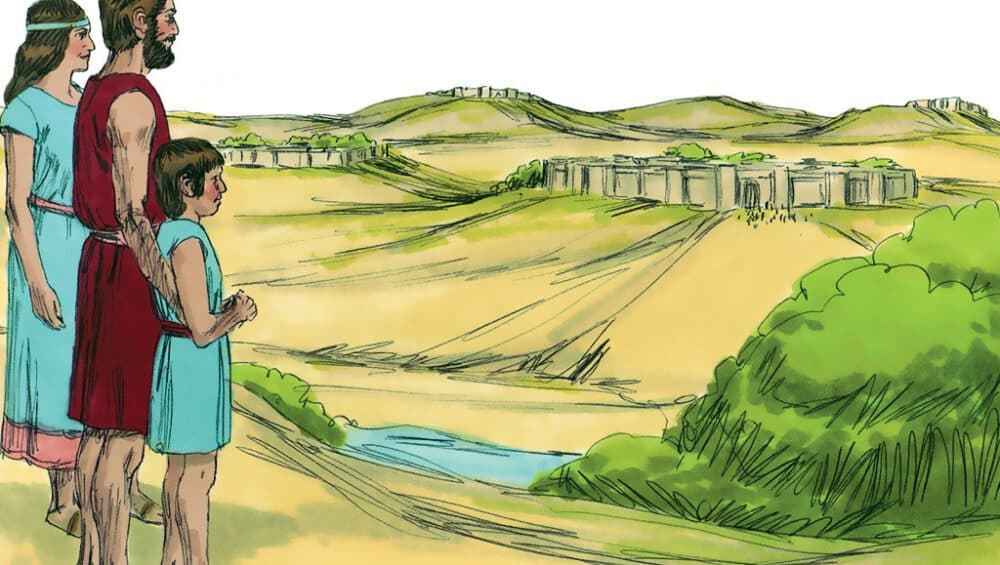Sweet Publishing / FreeBibleimages.org.
Welcome to Livin’ Light’s Bible-In-A-Year challenge of discovering God’s love for us and His purpose for our lives. Here is the format for this great adventure: The daily reading assignment is posted at 5 a.m. After each day’s reading, Leigh An Coplin, the blog host, shares observations and poses questions about difficult passages to Rob Fields, who studied Christian Education at Asbury Seminary and currently teaches Biology in the Orlando area. To start from the beginning, click on 365 Bible Readings and scroll down to Day 1. The reading schedule is taken from The One Year Chronological Bible NLT.
Today’s reading
— 1 Kings 2:1-9
— 2 Samuel 23:1-7
— 1 Kings 2:10-12
— 1 Chronicles 29:26-30
— Psalms 4-6
— Psalms 8-9
— Psalm 11
(970-979 BC) Click here for a timeline of the entire Bible.
We are getting heavy into the Psalms of David. For background information on Psalms, check out http://biblesummary.org/psalms/1.htm
Questions & Observations
Q. (1 Kings 2:5): So, we finally see that King David has a bit more punishment for Joab. Maybe since David is honoring God in the previous verses, David has God’s blessing to order Solomon to punish Joab?
A. Joab has continuously lived by the sword (in assassinating rivals to further his own career), and because of that, he will die by it.
Q. (2:8-9): So David promised not to kill Shimei, but he’s almost ordering his son to, and it sounds like he wants him to brutally murder him.
A. It is not David’s best moment, but cursing a ruler (as Shimei did) was against the Law (Exodus 22:28) and such behavior was rightly punished by death. In his wisdom, Solomon will not take his father’s advice, and will offer Shimei a way out similar to the city of refuge. You’ll see what happens whenever the reading picks up in Kings again.
Q. (2 Samuel 23:2-4): I am confused here if the verses are describing David or the Lord. If it’s David, he’s getting a little arrogant on his deathbed. Am I reading this wrong?
A. Actually, its neither David, strictly speaking, or God. These verses are about the idealized king of Israel, which will be seen as Jesus Christ, who rules through the righteousness of God. David is not speaking of himself here, but rather casting a vision of what those who follow after him — beginning with his son Solomon — should seek to match.
Q. (Psalm 4:2): Do you have any idea of whom David is saying is ruining his reputation?
A. No one specific, just his enemies, of which David has plenty all of his life.
Q. (Psalm 4:6-8): This is an interesting set of verses. From our readings thus far, I don’t think we have seen where God has shown his anger and caused hard times unless the people were disobeying/dishonoring God, except for Job and even then, Job had to battle with his ego a bit. I think it’s safe to say that humans cause their own bad times. But, what I get from this verse is that, regardless if you are in good or bad times, the only peace you can find is in God.
A. I think that is a very fair reading of the verses.
Q. (Psalm 5:1-6): To me in 1-3, David is telling God to “wake up and look at me.” This sounds selfish and disrespectful to me. Of course, God is listening. In verses 4-6, David is telling God what he is like. I think God would know himself pretty well. Verses 7-8 sound to me like they would be more pleasing to God. In verses 9-10, David sounds like he is judging and asking God for his blessing. Verses 11-12 are awesome. So, why does David change his delivery so much? This was an earlier Psalm, maybe he’ll become more reverent as we go?
A. Don’t count on reverence as we go. The Psalms jump through all kinds of emotions all over the place. Also, the poems are compiled into five different books (something that frankly will be difficult for us to see in this particular breakdown, obviously), and we don’t know exactly who did the editing or why. So, there is no reason to assume that they are assembled chronologically: we cannot assume that just because the Psalms are listed 8, 9, 10, that this was the order they were written in. Do not assume that the order the Psalms are placed in has any bearing on their “age.”
As to the irreverent content of the Psalm, all people go through frustrating periods where we feel that things are not going well, and it is human nature to blame God when things are not necessarily going right. So when the writer says, “why aren’t you watching,” perhaps he really means, “why aren’t you doing what I asked you to, God?” As I said, don’t expect that to stop here. The Psalms are filled with human emotion at its most raw, and in places like that, God is rarely treated with the full reverence he deserves.
Q. All of these psalms tell what instruments are supposed to accompany them. I guess this gives us a picture of the Levites who were assigned to music? So, these songs would be sung/performed in the temple for a congregation to hear?
A. They were probably used for worship of some sort, but it is hard to tell exactly what these poems were used for in the ancient world. It seems likely to me that David and other kings had these songs/poems performed in his court as part of his public acts of worship.
Q. (Psalm 6): This describes how David’s faith in the Lord is strong. But David is sorrowful because he doesn’t feel God’s involvement in his life. Rob, can you talk about this? Why do we feel such a strong pull toward God at times or like he is giving us clear direction and other times he seems so far?
A. We all go through periods of life when God feels closer or more distant. Some of that, frankly, has to do with how we are choosing God over our sins, and walking closely with Him, but having a good handle in the sin in our lives (hahahaha) is no guarantee that God will feel close.
In his book The Screwtape Letters, CS Lewis has a very insightful passage about God feeling close or distant. He notes that the ultimate goal of God’s relationship with human beings is to have them as faithful children, not infants. If you know anything about the process of helping an infant or toddler grow into being a child, there are a number of often-painful steps in the process. A toddler must learn how to walk, and the only way for that to happen is for the parent to withdraw their hand. Many times the toddler will fall at first, but if the parent never lets go, the child never learns to walk on his own. Our spiritual walk, Lewis says, can be seen in the same way. When we first commit to God, we often feel very close to God, but eventually, that emotional relationship must change, as all relationships do. And God must begin to “withdraw His hand,” if you will, in order for us to “walk.” It is the ultimate test of a believer in Christ to be getting radio silence from God, to not feel Him at all, and still obey what God commands. That is the surest sign of a faithful follower. I hope that helps.
O. (Psalm 8): It is amazing that God cares for humans so much. There are so many more things that seem much more majestic than us: mountains, stars, oceans, baby animals (!). And, yet, he chose us to share his kingdom with.
Q. (Psalm 9:8): We have talked of fairness before. In many of the Bible stories thus far, it seems to me that God’s wrath was not always fair. The more I read, the more I understand — or accept — God’s actions. But, to say He is fair. I don’t think God ever said He was fair. I thought we talked about fairness being something of a modern term. I guess they did have judges back then to hear cases. But, would you consider God fair? I’m not saying He has to be, He’s God. He can do whatever He wants. I envision when our judgment day happens, we will be judged with fairness.
A. To be judged fairly was one of the earliest questions of God by a man (Abraham to be specific, see Genesis 18), and Abraham’s conclusion is that we will be judged rightly by the ultimate Judge. Is God fair? That depends on whom you ask, I suppose. It is perfectly reasonable to expect God to be fair to us, but ultimately, God does not answer to us, we answer to Him.
Q. (Psalm 10:18): The American version of “poor.” We are definitely not poor. We have food, shelter, some savings. What we don’t have much of is disposable income. So, every month we go through our small budget fast and have to shift some money around and pray for some work — we do that a lot and yes, the work comes! I pray for enough money so we don’t have to scramble and we can focus on other things, like this blog and having the time — not working, relying solely on my husband’s job — to develop it into something more, what God is telling me to do with it. And, I think when we past the lottery billboards — the last one I saw said it was up to $191 million — that if I won that, we could give a huge chunk of money to our kid’s school, enough for them to build a new school and give money for more scholarships. Then, I would pay for all the mortgages of my family and close friends and totally give, give, give to charities. But, God hasn’t given me the winning six numbers. When He does, I’m making a bee-line to buy a ticket. But, as I have seen on TV, big sums of money are often the root of huge sorrow. So, I guess we’ll just keep on asking God for guidance. Then, when I see all the starving nations, it makes me feel super selfish! Like our pastor recently said, God gives you what you need when you need it.
A. Feel free to ask God for whatever you like. Nothing wrong with that. Just be careful about what God might expect of you in return! While we are free to seek out financial peace via the lottery or other wishful thinking (sorry!), it is ultimately our responsibility to be faithful to WHATEVER God gives to us. This means being generous to everyone, especially those who need it — whether they are poor or not — supporting ministries and churches that you feel God leading you to support, and being a good steward of what God has provided. That, ultimately, is what God desires of us when it comes to spending: Be a good steward, and to trust Him to take care of the rest.
Q. (Psalm 11): These first verses remind me of my questions about when David fled from enemies. I was wondering why God wouldn’t protect him and defeat the enemies at all times. But, I guess we just need to keep in tune with God and do what he tells us. If he tells us to hold down, stay, if he tells us to flee, run.
A. Sometimes there is great wisdom in fleeing as we saw with David. And sometimes, we must act on what we believe is God’s order to stand our ground. As with all of these issues we’ve been looking at today, we must trust that God will make the matter clear enough for us to act wisely, but I would say if God tells you to run, get going!
For more interest: How do you know if God is at work in your life? https://p2c.com/students/articles/how-to-know-if-god-is-working-in-your-life/
Shop: With God at your wheel, you will have a Good Life indeed! https://livinlight.org/product/overflow-t-shirt-2/
Tomorrow’s reading
— Psalms 12-17
— Psalms 19-21

